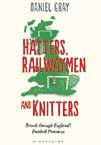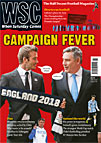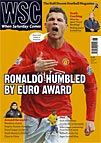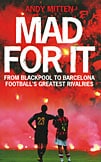 Travels through England’s football provinces
Travels through England’s football provinces
by Daniel Gray
Bloomsbury, £12.99
Reviewed by Charles Robinson
From WSC 321 November 2013
The ravaged post-industrial landscape of provincial England, with its boarded-up shops and disused factories, speaks of a working-class culture decimated by Thatcherism and modernism. Are we left with an endless hell of Nando’s, pound shops and Westfield shopping centres stretching the length and breadth of the land? Yes, in a way, answers Daniel Gray, author of Hatters, Railwaymen And Knitters, his superlative new book. But there’s hope in the oft-ignored footballing backwaters. Seeking to rediscover England and “Englishness” without attempting some sociological definition of it, Gray visits football grounds and their attendant communities in the hope of finding some commonality, some communalism, in this “alien, uncomfortable England”. He finds it – sometimes.
Gray starts his travels in the comfortable environs of home, Middlesbrough, and thus begins a search for identity, something once found easily at Ayresome Park thanks partly to two childhood friends, the threesome hunting for the autographs of players and staff they often don’t even recognise. From here we move on to Ipswich, Luton, Crewe, Burnley, Carlisle and beyond as Gray searches for the essence of English football.
Gray’s search is constantly, by turns, furthered and frustrated by contradictions and paradoxes. In Luton, the surfeit of white faces and offensive chants of the Kenilworth Road crowd reflect the “segregation and suspicion” of the town itself, despite the vibrancy and ethnic diversity of its markets and sports clubs. There’s a way forward here, Gray suggests, towards a more tolerant, inclusive and engaged community. A self-confessed reluctant patriot and leftie, Gray attempts to find the best in everything despite his occasional misgivings. It’s OK to believe in England and English football, seems to be the message. This is despite the fact that Luton is the original home of the English Defence League, formerly known as the United Peoples of Luton.
Gray, thankfully, eschews the Premier League and heads straight for the smaller towns and cities that contributed so much to the Industrial Revolution, with poverty and injustice pervading almost every chapter. The story of Luton’s Peace Day Riots of 1919, in which the town hall was burned down, is told with an historian’s eye for detail and context. The hardships of the workers in the factories and mills of Bradford and Burnley are also beautifully related, leading the assumption, or prejudice, as Gray admits, that football existed, and still exists, as a “working-class release valve”.
This prejudice is destroyed in part by a visit to Chester, home of a community-owned club in a prosperous part of England. Football can still surprise and the final chapter takes in a non-League game in Newquay, in which the barman safeguards Gray’s half-drunk pint until he reappears at half time to finish it.
While cynical and critical, the book is beautifully written; pessimistic and damning, yet joyful and full of love for the game. Gray’s journey is a personal search for the soul of English football but it’s one that we can all deeply sympathise with in this age of mass consumption and soulless plastic bowl stadiums. The reality remains of football offering, in the words of JB Priestley, a “more splendid form of life”. Daniel Gray’s wonderful book is proof of that.



 From Blackpool To Barcelona; Football’s Greatest Rivalries
From Blackpool To Barcelona; Football’s Greatest Rivalries